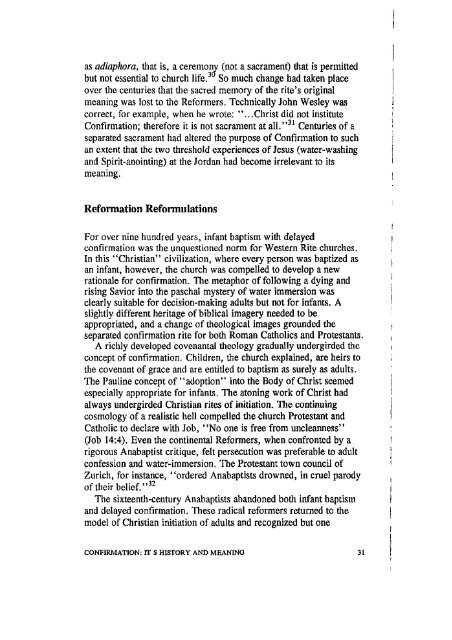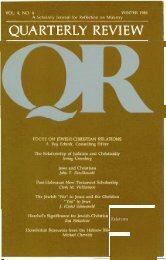TJieodore W. Jennings, Jr. The Meaning of ... - Quarterly Review
TJieodore W. Jennings, Jr. The Meaning of ... - Quarterly Review
TJieodore W. Jennings, Jr. The Meaning of ... - Quarterly Review
Create successful ePaper yourself
Turn your PDF publications into a flip-book with our unique Google optimized e-Paper software.
as adiaphora, that is, a ceremony (not a sacrament) that is permitted<br />
but not essential to church life. So much change had taken place<br />
over the centuries that the sacred memory <strong>of</strong> the rite's original<br />
meaning was lost to the Reformers. Technically John Wesley was<br />
correct, for example, when he wrote: "...Christ did not institute<br />
Confirmation; therefore it is not sacrament at all." 31<br />
Centuries <strong>of</strong> a<br />
separated sacrament had altered the purpose <strong>of</strong> Confirmation to such<br />
an extent that the two threshold experiences <strong>of</strong> Jesus (water-washing<br />
and Spirit-anointing) at the Jordan had become irrelevant to its<br />
meaning.<br />
Reformation Reformulations<br />
For over nine hundred years, infant baptism with delayed<br />
confirmation was the unquestioned norm for Western Rite churches.<br />
In this "Christian" civilization, where every person was baptized as<br />
an infant, however, the church was compelled to develop a new<br />
rationale for confirmation. <strong>The</strong> metaphor <strong>of</strong> following a dying and<br />
rising Savior into the paschal mystery <strong>of</strong> water immersion was<br />
clearly suitable for decision-making adults but not for infants. A<br />
slightly different heritage <strong>of</strong> biblical imagery needed to be<br />
appropriated, and a change <strong>of</strong> theological images grounded the<br />
separated confirmation rite for both Roman Catholics and Protestants.<br />
A richly developed covenantal theology gradually undergirded the<br />
concept <strong>of</strong> confirmation. Children, the church explained, are heirs to<br />
the covenant <strong>of</strong> grace and are entided to baptism as surely as adults.<br />
<strong>The</strong> Pauline concept <strong>of</strong> "adoption" into the Body <strong>of</strong> Christ seemed<br />
especially appropriate for infants. <strong>The</strong> atoning work <strong>of</strong> Christ had<br />
always undergirded Christian rites <strong>of</strong> initiation. <strong>The</strong> continuing<br />
cosmology <strong>of</strong> a realistic hell compelled the church Protestant and<br />
Catholic to declare with Job, "No one is free from uncleanness"<br />
(Job 14:4). Even the continental Reformers, when confronted by a<br />
rigorous Anabaptist critique, felt persecution was preferable to adult<br />
confession and water-immersion. <strong>The</strong> Protestant town council <strong>of</strong><br />
Zurich, for instance, "ordered Anabaptists drowned, in cruel parody<br />
<strong>of</strong> their belief." 32<br />
<strong>The</strong> sixteenth-century Anabaptists abandoned both infant baptism<br />
and delayed confirmation. <strong>The</strong>se radical reformers returned to the<br />
model <strong>of</strong> Christian initiation <strong>of</strong> adults and recognized but one<br />
CONFIRMATION: IT S HISTORY AND MEANING 31












